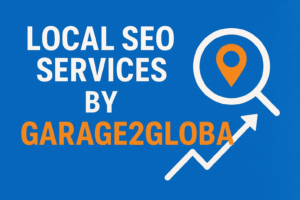Keyword bidding is a core concept in digital advertising that determines how visible your ads are on platforms like Google Ads and Bing Ads. If you’ve ever wondered why some ads appear at the top of search results, the answer often lies in keyword bidding strategy.
In this article, you’ll learn what keyword bidding is, how it works, types of bidding strategies, and expert tips to help you optimize your ad spend and achieve better ROI. Whether you’re new to pay-per-click advertising (PPC) or looking to fine-tune your search engine marketing (SEM) efforts, this guide has you covered.
What Is Keyword Bidding?
Keyword bidding is the process of setting a maximum amount you’re willing to pay for a click on your ad when a specific keyword is searched. This is part of the auction system used by Google Ads and other PPC platforms. When users type a search query, the platform determines which ads to show and in what order—based partly on how much advertisers bid on those keywords.
Key Components:
- Maximum CPC (Cost-Per-Click): The highest amount you’re willing to pay for a click.
- Quality Score: Google’s rating of the relevance and quality of your ads and landing pages.
- Ad Rank: A value used to determine ad position, calculated using bid amount, Quality Score, and expected impact of extensions and ad formats.
How Keyword Bidding Works
Imagine you’re running ads for a fitness brand and bidding on the keyword “buy protein powder.” Google runs an ad auction each time someone types that query. If your bid strategy and Quality Score outperform competitors, your ad might appear in the top position—even if you’re not the highest bidder.
The Auction Process:
- User types a search query.
- Google checks which ads are eligible based on keyword targeting.
- The system calculates Ad Rank for each eligible ad.
- Ads with higher Ad Ranks are shown in better positions.
Types of Keyword Bidding Strategies
Choosing the right bidding strategy is crucial for your campaign’s success. Here are the most common ones used in Google Ads and Bing Ads:
1. Manual CPC Bidding
You control the max cost-per-click for each keyword. Great for small budgets and granular control.
2. Enhanced CPC (ECPC)
Google automatically adjusts your manual bids based on the likelihood of a conversion.
3. Target CPA (Cost Per Acquisition)
Google sets bids to help you get as many conversions as possible at a target cost per action.
4. Target ROAS (Return on Ad Spend)
Ideal for eCommerce campaigns, this strategy aims to maximize revenue based on your desired return.
5. Maximize Clicks
Automatically sets bids to get the most clicks within your budget. Good for traffic generation.
6. Maximize Conversions
Google uses machine learning to optimize for the most conversions.
Why Keyword Bidding Matters for Your Business
Keyword bidding directly impacts your ad visibility, click-through rates (CTR), and return on investment (ROI). A well-structured bidding strategy ensures you’re not wasting money on low-performing keywords and are instead investing in high-converting ones.
Benefits:
- Better ad placement
- Increased click-through rate
- Higher conversion rates
- More efficient ad spend
Keyword Bidding vs. SEO: What’s the Difference?
While both keyword bidding and SEO aim to drive traffic through search engines, they work differently:
| Aspect | Keyword Bidding | SEO (Search Engine Optimization) |
|---|---|---|
| Speed | Instant results after campaign launch | Takes time to rank organically |
| Cost | Pay per click | Free clicks, but investment in content |
| Control | High control over placement and timing | Lower control once content is published |
| Longevity | Short-term traffic | Long-term growth |
Both are essential for a well-rounded digital marketing strategy.
Best Practices for Keyword Bidding in 2025
To stay ahead of the competition, consider the following keyword bidding best practices:
- Use Long-Tail Keywords: They have less competition and often convert better.
- Leverage Smart Bidding: Let machine learning optimize your campaigns.
- Monitor Search Terms Report: Discover new opportunities and weed out irrelevant clicks.
- Set Negative Keywords: Avoid wasting budget on unrelated queries.
- Test and Optimize: Continuously A/B test your ads and adjust bids accordingly.
Tools to Help You With Keyword Bidding
Several tools can simplify and enhance your keyword bidding efforts:
- Google Ads Keyword Planner – Discover new keyword opportunities and get bid estimates.
- Semrush – Analyze competitors and get insights into high-performing keywords.
- SpyFu – See which keywords competitors are bidding on.
- Ahrefs – Track paid keywords and ad performance.
- Optmyzr – Automate PPC bid management at scale.
Final Thoughts
Keyword bidding is the engine behind paid search success. Understanding how it works—and using the right strategies—can drastically improve your visibility, conversions, and ROI. With platforms like Google Ads becoming increasingly automated, staying informed and strategic is your key to outperforming the competition.
Whether you’re running a small campaign or managing a large ad budget, mastering keyword bidding is essential in today’s competitive digital landscape.
FAQs About Keyword Bidding
Q: How do I know how much to bid on a keyword?
A: Use Google Keyword Planner for estimated CPCs and start with a conservative bid. Monitor performance and adjust based on ROI.
Q: Can I change my keyword bids later?
A: Yes. Keyword bids are fully adjustable in real-time to optimize performance.
Q: What’s the difference between manual and automated bidding?
A: Manual bidding gives you full control; automated bidding uses machine learning to set optimal bids.
For More Information Visit Our Homepage:



